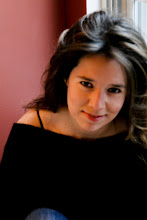
One of the things that they suggest we do prior to coming to Maine is to set some goals we'd like to achieve during the workshop. So, what are my goals?
1. Get an honest critique of my work
Look, I love you all for telling me how much you love my photography. That's always great to hear in any context. And more than anything, I'm glad it can provide some bit of pleasure for you. But if I'm really going see what I've got here, then I've got to hear what is specifically good and specifically bad about my work. Don't get me wrong, I'm not looking forward to it. But it's the only way that I'm really going to make significant growth as a photographer.
2. Learn new techniques for getting the best expression out of models/people
This is probably one of the main things that attracted me to this specific course. Sometimes I feel like I have a limited bag of tricks. I'm sure that those of you that I've photographed more than once are pretty familiar with them at this point! So, if I'm photographing someone and find that these tricks aren't working, I start to get nervous and tense...which is only bad for the end result! It would be nice to have a wider variety of techniques to pull from.
3. Learn better ways to use outdoor light for portraits
This is probably the second thing that really attracted me to this course. The portraits that most draw me in are the ones that have an evocative use of light. One of the goals of the course is to show us how to set up a simple outdoor studio, as Joyce does. Often times I feel like I'm trapped by whatever light I happen to find that day. To some extent, I'd think that natural light photography will always have that issue, but I'm curious to see how having more control over the outdoor light will impact my photographs.
4. Work more freely and creatively
Sometimes when I'm photographing people, I even bore myself. It's the same angle over and over, it's the same expression. My gut tells me that many of my assignments in the coming week will push those boundaries. Still, it will be nice to come up with new techniques to use when I feel myself getting into a rut. And while digital definitely makes it easier to take a risk, I'd like to see how far I can push it. Sometimes I think (particularly in a portrait session) that I don't take strong risks as I want to guarantee that I'll have at least one picture that isn't horrible and I can give to the person. However, what would happen if I really went out there and risked coming back with nothing?
5. Understand what makes my vision different from all other photographic visions (the passover question!)
If there is one thing that will stay with me from grad school, it's Debby asking me the question "What makes this paper different from all other papers?". It's a useful question. Probably one of the most useful questions you can ask yourself. I've found that if I can't answer that question on any project that I'm working on, then I don't have a clear enough vision for it to be successful. While I have a vague idea of what makes my photographs uniquely mine (the level of tension and emotion/sensitivity, the use of blur/bokeh, the angles, the close crop), I would like to be able to answer that question more concretely. Are those things really so different from what other photographers do? What is it about the way I combine these elements that creates a statement? Is there an unifying statement about my photography?
6. Get some ideas on where I can take my photography
So, in the end, what do I want to do with all of this? While I love doing portraits, I am not your normal portrait photographer. I really don't think I'd be happy taking photographs of people's kids from here on out, even if the parents understood my photographic vision. Nor do I see myself making this a fulltime thing any time soon. Art is meant to be shared. So, what's the best way of sharing what I do?




No comments:
Post a Comment